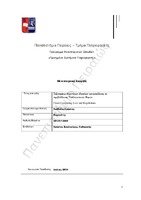Ταξινομία ρυθμιστικών πλαισίων και ασφαλείας σε περιβάλλοντα υπολογιστικών νεφών
Cloud computing: law and regulations

Subject
Cloud computing ; Υπολογιστικό νέφος ; Πληροφορική -- Δίκαιο και νομοθεσία ; Information technology -- Law and legislationAbstract
Cloud computing is an architectural approach that hopes to take over and mainly to replace all these solutions that we know today. It is a phenomenon that is continuously growing and offers advantages that make it extremely attractive either in the private or in the public sector, as it gives the possibility to reduce the cost of hosting infrastructure facilities and information systems to integrate existing solutions to new, utilizing the minimum possible expertise. On the other hand, it is associated with disadvantages such as the protection of sensitive data, the lack of control on the part of the user and the security of such data. According to what is recorded in the text of the strategy 'Horizon 2020', the development of the digital economy can bring huge benefits for citizens, but also for the overall economy of a country. However, for the transition towards cloud computing public and private bodies must develop security and trust, which will occur through appropriate regulatory and legal frameworks to be adopted by the European Union and individual countries. In this master thesis it is examined and analyzed the possibility of problems due to the interaction between systems of entities governed by different regulatory frameworks operation between countries with different legal frameworks and between different institutional actors. It is carried out a recording, comparison and analysis of the current regulatory and legal frameworks for cloud computing implementations in various countries of the European Union, either in the private sector or the public. Finally, it is made an assessment and comparison of the existing policy of Greece and the respective European countries.


